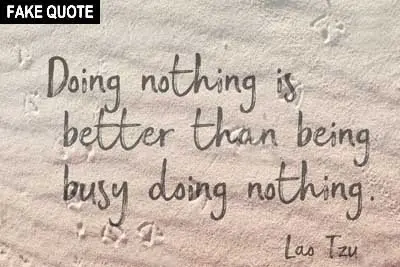Fake Lao Tzu Quote
"Doing nothing is better..."

This is NOT a quote from Tao Te Ching:
"Doing nothing is better than being busy doing nothing."
The Book
The Taoism of Lao Tzu Explained. The great Taoist philosophy classic by Lao Tzu translated, and each of the 81 chapters extensively commented. Click the image to see the book at Amazon (paid link).
More about the book here.
|
Doing nothing is something very familiar to Lao Tzu, indeed. It is his concept of non-action,
wu-wei, which he mentioned a lot in his Tao Te Ching. The sage knows to do as little as possible and thereby the most is accomplished, at least the most beneficial.
Also being busy doing nothing can, though by a stretch, be connected to his thoughts. But what he meant was rather that trying to do a lot accomplishes nothing. He saw no effort in doing nothing, so how could someone be busy with it?
|
90 of the most spread false Lao Tzu quotes, why they are false and where they are really from. Book by Stefan Stenudd. Click the image to see the book at Amazon (paid link).
More about the book here.
|
The oldest source I have found to this quote is a book from 1950: Explorations in Altruistic Love and Behavior, edited by the sociologist Pitirim Sorokin. In one of the book's essays, by Sorokin and D. S. Gove, they write (page 298):
… Laotse's old wisdom that the best government is that which governs least, that doing nothing is better than being busy doing nothing, and that the more various punitive laws are enacted the more numerous become the criminals.
Their wording clearly indicates that they are paraphrasing Tao Te Ching. The last statement is undoubtedly from chapter 57, where the relevant lines read (my version):
The more laws and commands there are,
The more thieves and robbers there will be.
As for the principle of governing with as little action as possible, Lao Tzu mentions it several times in his text, also in chapter 57:
Use non-action to govern the world.
But there is no comparison of doing nothing as opposed to being busy doing nothing in that chapter — or any other one.
Sorokin must still have grown attached to this strange paraphrasing of Lao Tzu's principle. He used it in another essay from the same year, published in the book Sociometry in France and the United States, edited by Georges Gurvitch (page 219), where he called it a "Taoist dictum," not mentioning Lao Tzu. And again in his own book The ways and power of love from 1954 (page 369), claiming it to be both a Taoist and Buddhist statement.
Stefan Stenudd
September 14, 2020.
There are many more fake Lao Tzu quotes examined on this website.
Click the header to see a list of them.
Click the header to read a "fake" interview with Stefan Stenudd, the author of
Fake Lao Tzu Quotes.
My Taoism Books
Click the image to see the book at Amazon (paid link).
The Taoism of Lao Tzu Explained. The great Taoist philosophy classic by Lao Tzu translated, and each of the 81 chapters extensively commented.
More about the book here.
The Ancient Wisdom of the Tao Te Ching by Lao Tzu. 389 quotes from the foremost Taoist classic, divided into 51 prominent topics. Click the image to see the book at Amazon (paid link).
More about the book here.
Erroneous Tao Te Ching Citations Examined. 90 of the most spread false Lao Tzu quotes, why they are false and where they are really from. Click the image to see the book at Amazon (paid link).
More about the book here.
|
My Other Websites:
The 64 hexagrams of the Chinese classic
I Ching and what they mean in divination. Try it online for free.
The ancient Chinese life energy
qi (
chi) explained, with simple instructions on how to exercise it.
The many ancient and modern life force beliefs all over the world explained and compared.
Other Books by Stefan Stenudd
Click the image to see the book at Amazon (paid link).
The Greek philosophers and what they thought about cosmology, myth, and the gods.
The life energy
qi (also
chi or
ki) explained, with exercises on how to awaken, increase and use it.
Basic concepts of the peaceful martial art. Aikido principles, philosophy, and fundamental ideas.
Qi, prana, spirit, ruach, pneuma, and many other life forces around the world explained and compared.
Jungian theories on myth and religion examined, from Carl G. Jung to Jordan B. Peterson.
About me
I'm a Swedish author and aikido instructor. In addition to fiction, I've written books about Taoism and other East Asian traditions. I'm also an historian of ideas, researching ancient thought and mythology. Click the image to get to my personal website.

 Tao Te Ching
Tao Te Ching Now it's a book, too!
Now it's a book, too! Tao Quotes
Tao Quotes Cosmos of the Ancients
Cosmos of the Ancients Qi — Increase Your Life Energy
Qi — Increase Your Life Energy Aikido Principles
Aikido Principles Life Energy Encyclopedia
Life Energy Encyclopedia Archetypes of Mythology
Archetypes of Mythology Stefan Stenudd
Stefan Stenudd